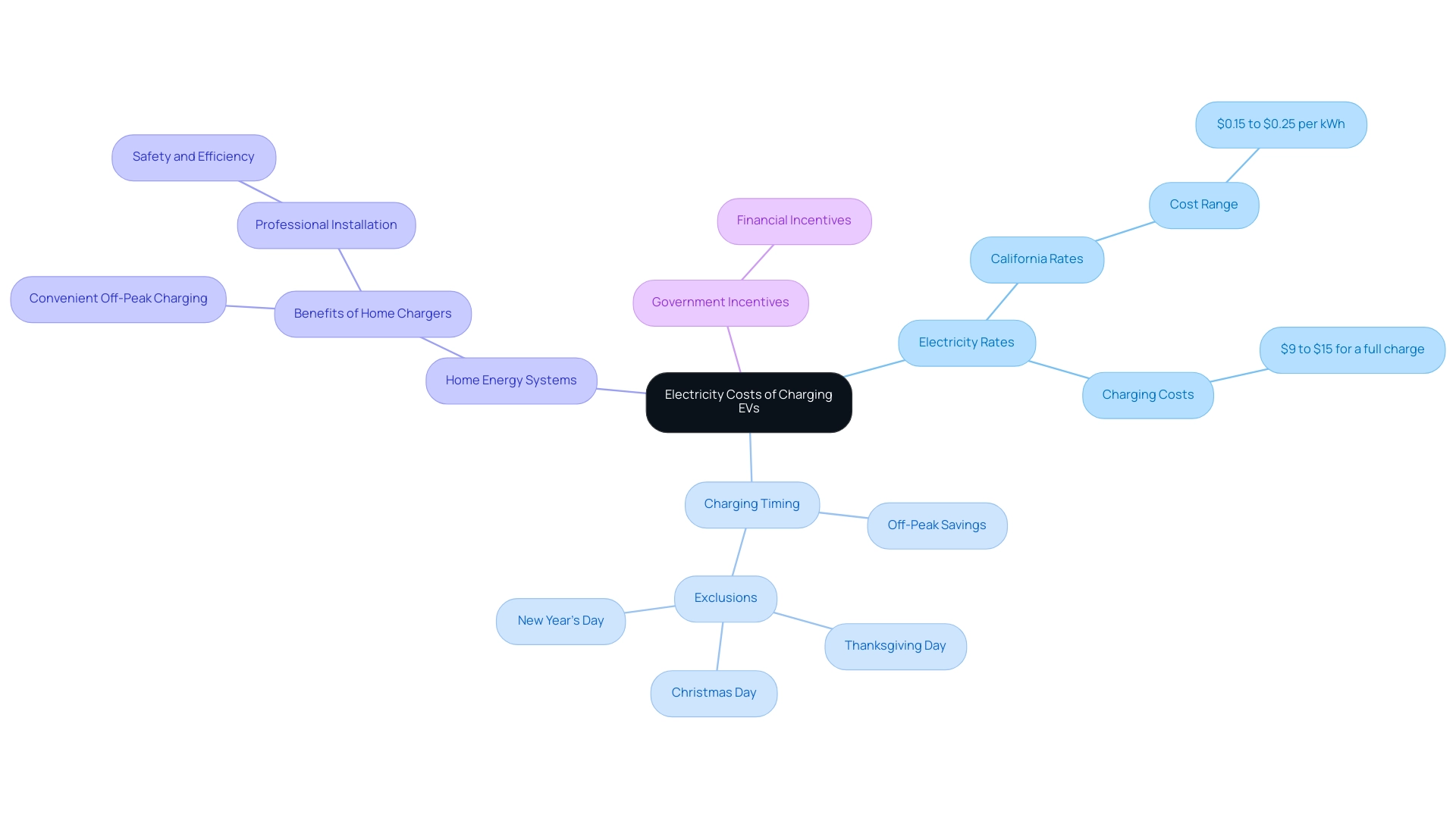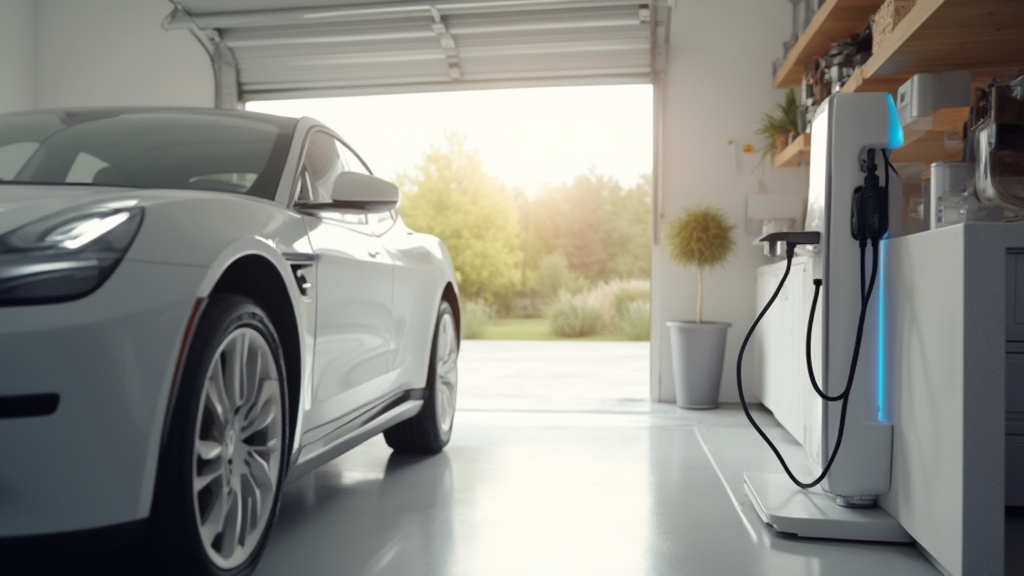Introduction
As electric vehicles (EVs) gain popularity among environmentally conscious homeowners, understanding their technical characteristics and electricity consumption becomes crucial. These innovative vehicles, powered by efficient electric motors and rechargeable lithium-ion batteries, promise not only a reduction in tailpipe emissions but also a shift in how energy is consumed at home.
With the right knowledge, homeowners can navigate the complexities of:
- Charging costs
- Battery capacities
- The environmental impact of their electricity sources
This article explores the intricacies of electric vehicles, the benefits of integrating home solar systems, and the exciting trends shaping the future of sustainable transportation. By delving into these topics, homeowners can make informed decisions that align with their sustainability goals while enjoying the financial advantages of going green.
Understanding Electric Cars: Technical Characteristics and Their Impact on Electricity Use
Electric cars, or EVs, come packed with technical features that significantly influence the electricity consumption of electric cars. At the heart of their operation are electric motors fed by rechargeable lithium-ion batteries. These motors excel in efficiency, converting over 77% of the electrical power sourced from the grid into real power at the wheels.
In contrast, conventional gasoline modes of transport manage to convert only about 12% to 30% of their power. A vital element for eco-conscious homeowners to contemplate is battery capacity, measured in kilowatt-hours (kWh), which directly influences the range and the electricity consumption of electric cars. For instance, a typical electric car might have a battery capacity of around 60 kWh, allowing it to travel approximately 200 miles on a single charge, averaging about 0.3 kWh per mile.
However, as the industry moves closer to the widespread adoption of electric transportation, challenges like overcapacity in battery production, particularly in China, may impact producers’ margins if they cannot find external customers. Andreas Mair, Director of Mechanical Engineering at GKN Automotive, notes that innovative solutions in size, weight, and resource efficiency will be crucial for achieving price parity with internal combustion engine modes of transport and promoting sustainable transportation. With China controlling nearly 90% of global installed cathode active material manufacturing capacity, decreased margins for producers could pose risks if they struggle to secure sufficient external customers.
For homeowners considering the switch to electric vehicles, grasping these characteristics is vital. Not only does it help estimate potential electricity costs, but it also underscores the savings from embracing this eco-friendly transition, particularly in relation to the electricity consumption of electric cars. Furthermore, comprehending the characteristics of photovoltaic batteries, such as their capacity and efficiency, is crucial for effective power management in residential environments.
Selecting the appropriate battery can enhance energy independence and reduce reliance on the grid, especially during peak usage times. The economic attractiveness of residential photovoltaic and storage systems keeps increasing, as they not only offer backup power but also assist in reducing escalating energy expenses. Powercore Electric Inc. is here to assist with services like solar panels, battery backups, and EV charging stations, making your journey towards sustainability easier!
The Environmental Impact of Electricity Consumption in Electric Vehicles
For eco-conscious homeowners, understanding the environmental impact of power usage in electric vehicles (EVs) is essential. While EVs are celebrated for producing zero tailpipe emissions, the true measure of their environmental footprint depends on the source of the power used for charging. When powered by renewable energy sources like solar, the associated carbon emissions from driving an electric car can be significantly minimized.
However, if the electricity originates from fossil fuels, like coal, the environmental advantages may be compromised. Research indicates that even when charged from a grid predominantly reliant on coal, EVs can still yield lower emissions over their lifetime compared to traditional gasoline vehicles. This highlights the importance of incorporating renewable power solutions, such as installing residential photovoltaic panels, to fully utilize the ecological advantages of electric vehicles.
In Southern California, initiatives like the increase of sunlight-powered EV charging stations in Los Angeles are paving the way for more sustainable power use. Homeowners can also explore top roof designs that optimize energy from the sun for their residences in San Diego, ensuring they get the most out of their panel installations. Additionally, the recent Public EV Charging Infrastructure Playbook developed by the National Renewable Energy Laboratory (NREL) highlights how communities are planning for EV charging infrastructure, which is increasingly supported by nearly half a billion dollars in federal funding for more than 9,200 public charging ports.
As Kaylyn Bopp, project lead for the Playbook, states, “The Playbook is a win for communities looking to build out the national EV charging network.” Homeowners considering the switch to EVs should thoughtfully evaluate how the electricity consumption of electric cars aligns with their sustainability objectives, enabling them to make informed choices that contribute to a cleaner, greener future. To further enhance your sustainability efforts, consider contacting Powercore Electric Inc. to explore our range of renewable energy solutions, including panel installations and battery backups.
By transitioning to solar power, you can not only reduce your carbon footprint but also enjoy significant cost savings and take advantage of available incentives. Start your journey towards a sustainable energy future today!
Electricity Costs Associated with Charging Electric Vehicles
Charging your electric vehicle can lead to varying energy costs, which depend on several factors affecting the electricity consumption of electric cars. In California, the average cost of power typically ranges from $0.15 to $0.25 per kilowatt-hour (kWh). For an EV equipped with a 60 kWh battery, a full charge could set you back anywhere from $9 to $15.
However, savvy homeowners know that the timing of when they charge can significantly impact these expenses. Many utility companies offer lower rates during off-peak hours, meaning you could save a nice chunk of change by plugging in overnight or during designated off-peak times. Just keep in mind that exclusions for off-peak hours include Thanksgiving Day, Christmas Day, and New Year’s Day, so planning your charging around these dates can maximize savings.
Additionally, considering a home energy system can be a game-changer, allowing you to generate your own electricity for charging, leading to remarkable long-term savings. Our case studies show that having a home charger enables convenient off-peak charging without the hassle of public stations. At Powercore Electric, we ensure a professional installation process that includes:
- A thorough site assessment
- Any necessary electrical upgrades
- Rigorous testing for safety and efficiency
Moreover, homeowners can benefit from government initiatives that offer financial incentives for installing renewable power systems, making the shift to sustainable sources even more attainable. As for Tesla home chargers, prices typically range from $400 to $700, depending on the model and installation requirements. As Michael Pope, one of our experienced electricians, puts it, ‘Our customers can expect honesty in how we conduct our business, expertise in our recommendations, quality installation and maintenance, and exceptional customer service.’
Comprehending the electricity consumption of electric cars not only assists you in budgeting efficiently for your electric transport usage but also enables you to make knowledgeable choices that correspond with your eco-friendly lifestyle while enjoying the advantages of renewable power.

The Role of Home Solar Systems in Electric Vehicle Charging
Home energy systems are essential for enhancing both the sustainability and cost-effectiveness of electric vehicle (EV) charging, particularly by optimizing the electricity consumption of electric cars. By utilizing clean, renewable power, eco-conscious homeowners can significantly lessen their reliance on grid supply, especially during peak hours when rates tend to increase. To meet the daily electricity consumption of electric cars, around four panels of 500 Watts each might be required, resulting in significant savings on utility bills.
As Shane Kallat aptly puts it, ‘Yes! By installing photovoltaic panels at home, you can capture the sun’s power to produce electricity, which can then be utilized to charge your EV.’ Furthermore, contemporary photovoltaic systems frequently include battery storage options, enabling homeowners to retain surplus power generated during the day for evening consumption. This feature not only enhances the overall efficiency of renewable resources utilization but also provides crucial security, especially as homeowners seek protection against potential blackouts.
Furthermore, many homeowners can potentially earn money by selling excess power back to the grid, amplifying the financial benefits of transitioning to renewable sources. The case study ‘Solar Charging for EVs’ demonstrates how effectively utilizing sunlight can help reduce the electricity consumption of electric cars, thereby contributing to a more sustainable power ecosystem. For individuals in locations such as Long Beach seeking to adopt electric transportation, incorporating solar power options, including the ‘Power and Protect Your Home’ services, can greatly improve efficiency.
This integration not only makes it a wise investment for both the environment and household budgets but also provides essential guidance for renters seeking eco-friendly power solutions, including insights on Tesla home chargers and other available services.
Future Trends in Electric Vehicle Electricity Consumption
The realm of electric vehicle technology is advancing swiftly, and numerous thrilling trends are poised to transform how we utilize power in our residences. One of the most notable advancements is the development of faster charging technologies, which promise to significantly cut down on the time it takes to recharge our EVs, such as Tesla home chargers. This leap forward is complemented by the integration of smart grid technologies, enhancing power distribution and enabling smarter management of electricity consumption, particularly during peak demand periods.
Powercore Electric Inc. provides services such as photovoltaic panels and battery backups, which can assist homeowners in optimizing their resource efficiency by storing surplus power for future use. Additionally, there are government programs available that provide financial incentives for homeowners who invest in solar power solutions. Notably, Innoscience’s bidirectional Vegan HEMT technology saves up to 64% space and reduces heat generated, showcasing significant advancements in efficiency.
Moreover, with the growing acceptance of transport-to-grid (V2G) technology, electric transports can now potentially return power to the grid, promoting a more dynamic and sustainable power ecosystem. The significance of galvanic isolation in electronic circuits, as examined in a recent case study, highlights how wide bandgap semiconductors can improve industrial efficiency, further benefiting the electric transport sector. As Maurizio Di Paolo Emilio highlights,
Infineon reveals state-of-the-art wide bandgap innovations at Electronica 2024, promoting sustainability, electrification, and renewable resource integration globally.
For eco-conscious homeowners, staying informed about these trends is essential, as they not only enhance the efficiency and convenience of electric vehicle usage but also contribute to a more sustainable energy landscape that benefits the community at large, especially regarding the electricity consumption of electric cars. For more information or inquiries, you can contact Powercore Electric Inc. at ryan.serrano@powercoreinc.net or call (916) 699-8778.
Conclusion
Understanding the intricacies of electric vehicles and their energy consumption is vital for homeowners aiming to embrace sustainability. With their efficient electric motors and the potential for renewable energy integration, EVs provide a pathway to reducing carbon footprints while enjoying significant cost savings. The technical characteristics of these vehicles, from battery capacities to charging costs, reveal the importance of informed decision-making in the transition to greener alternatives.
Moreover, the environmental impact of electricity sources used for charging cannot be overlooked. By opting for renewable energy solutions like solar panels, homeowners can maximize the benefits of electric vehicles and contribute to a cleaner environment. The growing infrastructure for EV charging, supported by government initiatives, further highlights the commitment to sustainable transportation.
Ultimately, the integration of home solar systems not only enhances the cost-effectiveness of charging electric vehicles but also empowers homeowners to take control of their energy consumption. As advancements in technology continue to reshape the landscape of electric vehicle usage, staying informed and proactive can lead to a more sustainable and economically beneficial future. Embracing these changes not only supports individual goals but also fosters a collective movement towards a greener planet.


